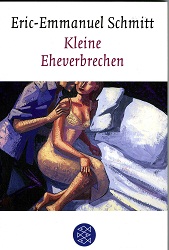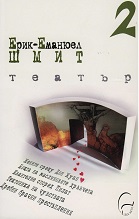Summary
Gilles is suffering from amnesia as the result of a mysterious accident. He returns to his wife of fifteen years a stranger to himself.
Who is he?
Who is Lisa?
What used their married life to be?
From what she tells him, he tries to piece together their existence. But suppose Lisa is lying?
Can Gilles be sure he is the man she describes, and is she in fact his wife? A suspenseful thriller about a couple in search of the truth. A black comedy full of surprises in which light-hearted banter alternates with full-scale war.
Comments
« I have never understood what genre »
I have never understood what genre conjugal life belongs to: tragedy or comedy? My only certainty is that it belongs to the dramatic genre…
When I started Partners in Crime, I was filling a gap – to my knowledge, there is no play about lasting love. You can find thousands of plays about the beginning of love, hundreds about the end of love, the best known (such as Romeo and Juliet) about both the beginning and the end, but there’s nothing about persistent, ongoing, hardwearing love, in other words, marriage. The theatre apparently only accepts debutant or retired lovers; it seems to confine itself to incipient and comatose love and never presents living love.
Why are we never allowed a glimpse of mainstream reality? What becomes of Romeo and Juliet after 15 years? What do champion lovers feel after a few children and years of cohabitation? This failing in the dramatic repertoire eventually alerted my suspicions…If comedies end with marriage, might this not be to stop them turning into tragedies?
And if dramas and tragedies only represent thwarted love, perhaps this is only so as to leave us with our illusions?
The rare exceptions I found were hardly encouraging: Feydeau, Strindberg and Ionesco depict aged couples; their sketches border on caricature and take the form of sardonic farce on the theme, if the couple’s still there, love isn’t.
Can love survive the initial encounter? Does it still breathe when it ceases to be crossed? What happens to Romeo and Juliet after they are married?Only life could provide the answer to this question.So I had to wait till I was over forty to get an idea of conjugal relations and then to turn the idea into a play. Partners in Crime is proof of this maturity.
Far from romanticism and Hollywood idealism, the play bears the marks of realism, even if, like my other plays, it is not written in a realist style; it probes the complexity within us rather than simplifying it.
From experience, it seemed to me that forming a couple really is a most hazardous journey, the most dangerous you can make in love. How banal ‘adventures’ seem by comparison…
For marriage involves two dimensions that you don’t find in short affairs: absence of illusion and suffering.
Absence of illusion, because for six months or two years, you can go on not noticing who your partner is, embellishing him/her, overlooking his/her faults and playing down incompatibilities. Thereafter, reality sets in and love becomes lucid.
Suffering, because while everything is pleasure, joy and exaltation at the start of a flirtation (one is more in love with love than the beloved), other feelings then come into play. The strategies and compromises that shared existence calls for open up a field of defeats and grief. For some people, jealousy grows alongside attachment, for others, absences become increasingly painful and above all, the harmony of marriage creates a new feeling: fear of abandonment and terror of loneliness.
Violence and passion remain but come out in other ways.
Although Partners in Crime involves a tortuous plot, its ins and outs are merely a way of analyzing marriage.
In the play, amnesia is more than just a theme: it is a means of investigation and ultimately, a metaphor for husband and wife. Thus, Gilles had lost his memory well before this fatal night; he had forgotten the essential, forgotten to look at his partner, forgotten to listen to her, to ask questions, to get her to confide in him, to tell her how important she was in his life and to express his love. Thus too, well before this night, Lisa had, of her own volition, been practising the amnesia of her frustrations, doubts and fears and had shut herself off in silence, imbibing the unconsciousness brought on by alcohol.
The night of crisis in Partners in Crime shows, ultimately, the benefit of conversation. Through words, wiles and even blows, the two protagonists start talking again and therefore start to recover. Everything naturally deteriorates anyway, but when you add negligence the downward process is speeded up exponentially. Cruel as it is, my play is nevertheless not without genuine optimism, because love can last. But for love to last, the lovers must at the very least want it to. Active will and thought are major players in a love story; it’s intelligence not habit that can sustain passion.Whenever I write, I discover what I think, sometimes with surprise. I was amazed, for instance, to see the word ‘mystery’ issuing from my pen in a context so far removed from religion. Fair enough in The Visitor or Two World’s Hotel, but here! When Gilles tells Lisa that she is giving way because she cannot bear the idea of abandonment, that things are eluding her, situations are too hard and feelings too big for her, he is putting forward the idea that you have to ‘accept uncertainty’ and ‘have faith’ with ‘that faith that is not possessed but is given’. ‘It’s not truth couples have to share but mystery, the mystery that I like you, that you like me, the mystery that it doesn’t end.’ I realized through my characters’ dialogues that in love there’s a profound lack of rationality, which is absolutely vital. Telling stories helps me take my thoughts further. In Enigma Variations, I defined love as ‘tirelessly living a mystery’, but I said in Partners in Crime that above all you have to ‘agree to the mystery’. Spiritual themes and psychological themes are thus governed by the same logic and finally show the same unexpected similarities. The coherence of the mind works in curious ways – a coherence I discovered rather than invented as its author.
Partners in Crime was received with immediate enthusiasm. I imagined the story would only interest people who were the same age as my characters, but I found that all sorts of people saw themselves in Gilles or Lisa. Even so, couples who came to talk to me after the show reacted differently depending on their generation. Twenty-year-olds told me ‘How cruel!’, forty-year-olds, ‘Spot on!’, while sixty-year-olds said ‘How sweet!’ They were all right! At twenty, you want love to be straightforward; at forty, you find it complex; at sixty, you know it’s good because it is complex.
I have learned a lot through this play. Even as a child, I used to wonder as the curtain fell on young newly-weds: what happens now? As I finished Partners in Crime, I felt I perceived the answer: might it be that love begins when you cease to be in love?
Eric-Emmanuel Schmitt, September 2005.
Copyright Antigone.
Reviews
Magazine Littéraire - « A man has received a blow on the head ... »
A man has received a blow on the head and finds himself back in his flat with a woman he does not know but who is nevertheless his wife.
His confusion is the result of amnesia - or so we are led to believe, for Schmitt has more than one coup de théâtre up his sleeve. Repeatedly, the characters turn out to be other than we imagined. In contrast to the usual gender stereotyping, neither is a stranger to harshness and criminal impulses. Marital relationships are the central theme in this chiaroscuro play where calm alternates with violence, courtesy with brutality, dawdling with haste. On the face of it, the iron hand is in the velvet glove, as Gilles and Lisa strive to shield one other from the truth. At a deeper level, this is a treatise on the human bonds that get worn away and whose only salvation, or second wind, is possible through a crisis and the resolution of that crisis.
Schmitt engagingly disentangles the old-fashioned and modern elements in the emotional and amatory behaviour of contemporary man... and woman.
Gilles Costaz
Le Figaro - « Just when you thought you'd caught the leaf fluttering ... »
Just when you thought you'd caught the leaf fluttering in the breeze, the wind picks up and whips it away; the instant you think you've hit on a truth, new information refutes it and leaves you at a loss. The gradual undermining of our certainties is the subject of Eric-Emmanuel Schmitt's new play, Conjugal pecadillos (Petit Crimes conjugaux).
From the author or Enigma Variations comes another psychological 'thriller' that shows him at his mischievous best, revelling in his authorial omniscience, manipulating and puzzling both characters and audience. You can almost see him sneaking about in the background, rubbing his hands in glee at the farce he's concocted.
A sort of Hitchcock stalking unphased past the camera. Schmitt mercilessly leads the audience on to these shifting sands: whom should we believe? At what point has a character said something sincere, if not actually true? Schmitt delves into everyday human behaviour and seems to ask: is this what conjugal life is - this hell of psychological cruelty? This mass of conflicting interests, which evolve as the dialogue unfolds in a dazzling volley of murderous or ambiguous lines? Conjugal Pecadillos is a sparkling comedy but there's scarcely a glimmer of optimism. Dark, sometimes tragic undertones (on the theme of alcohol, for instance) show through as Schmitt unravels the strings in which Gilles and Lisa, and perhaps all couples, are caught.
Armelle Héliot
Le Parisien - « A work so intelligent ... »
A work so intelligent it makes the audience feel intelligent.
André Lafargue
Les Echos - « A man and a woman: a couple involved in a war of attrition. »
A man and a woman: a couple involved in a war of attrition. What could be more frayed or fundamental than a married couple? And what more enthralling than a clever play performed by everyone's favourite stars? With applause still echoing for the hugely successful Oscar and the Pink Lady, Eric-Emmanuel Schmitt is already back on stage, ubiquitous and indefatigable.
Hardly have the posters appeared for his new play, Conjugal Pecadillos (Petits crimes conjugaux), starring Bernard Giraudeau and Charlotte Rampling, than theatre-goers are rushing to the box office. They will not be disappointed by this magical performance of a machievellian play. Schmitt's sense of dialogue, suspense and drama has gone from strength to strength since The Visitor and Enigma Variations.
His talent for keeping the audience on the edge of their seats has here reached new heights. In this double act on the theme of two characters in search of the truth about each other, the twists and turns are far too many and too ingenious to penetrate. A delightful opening, as intelligent as it's intriguing, leads into a duel of guarded questions and poisoned lies, but the end could not be gentler. Charlotte Rampling's magnificent performance in this play of sparkling subtlety marks her theatre début. Bernard Giraudeau acts opposite her with stunning negligence and rapacious seduction, showing false naivety and hypocrisy but also genuine pain.
Annie Coppermann
Le Canard Enchaîné - « Love and conjugal life are the subject of this play. »
Love and conjugal life are the subject of this play. What happens between a lady and gentleman, however intelligent, however well disposed towards each other and however well-balanced, after 15 years' cohabitation? The answer is bleak: it's hell, a hell where the damned are stirred with the bowl and not the back of Old Nick's long-handled spoon. For a start, copulation is like 'two assassins joining forces', and the couple is 'united by the violence that throws them together'.
Their performance doesn't improve over time, because they start a family. 'The family! That's the biggest bluff of all. Because they've made their ferocious, sensual embraces look like they're doing the human race a favourâ?¦ Now they can deal out blows, punishments and kicks in the name of education and pester each other with their stupidity and noise.' They're at their worst in old age: 'nothing's against the rules in this fight: manias, sickness, deafness, indifference, senility. The winner is the one who's left to grieve for the other.' Lines to be savoured.
It would be unfair to reveal the intrigue for fear of spoiling the whole business - the major business of conjugal life. Staging Conjugal Pecadillos was a fine idea on everyone's part, and there's no doubt that the house will be full night after night. Charlotte Rampling as Lisa is all poisonous charm and savagery, while Bernard Giraudeau's Gilles is a masterly portrayal of a man who's been around but is not blasé.
Bernard Thomas
La Liberté (Suisse) - « A play that doesn't pull its punches ... »
A play that doesn't pull its punches and will have audiences on the edge of their seats, laughing and terrified by turns. A couple engages in a duel of words; one of them appears to have killed the other but it's not obvious which is the victim and which the perpetrator. Amnesia is the faintly hackneyed excuse but it is treated with derision - no long drawn-out suspense here: Gilles and Lisa progress through this scene of married life at a steady pace.
Eric-Emmanuel Schmitt controls the brief exchanges with awesome precision and provides theatre directors with all the necessary stage directions.
EWI
Le Bulletin des Lettres - « Partners In Crime »
A dark apartment. Enter a man led by a woman. Light. This flat is his home, but he doesn't recognise it. He's just returned from a week in hospital suffering from amnesia after a blow on the head. The woman, his wife, does her best to help him recover his memory - at least, so we believe during this brilliant overture on the theme of amnesia. This could be a Giraudoux play - his Siegfried, for instance -, not least because it's written theatre, and well written, where every expression is exactly right and the lines bounce off each other as naturally as a tennis ball, in the best manner of psychological drama.
With no division into scenes or acts, no action and no change of place, there's nothing to detract from the main dramatic thrust: a man and a woman going through a crisis where the tension mounts before a resolution is found [...]. All the worst aspects of conjugal life are wheeled out in this superb dramatisation of marriage: jealousy, hypocrisy, egoism, blindness and the more ordinary attrition and tactlessness. At another level, memories of that first meeting, complicity, humour and tenderness may still tip the balance. Nothing can be forgotten or erased, which would in any case be worse; the couple just has to start afresh in total lucidity. This is theatre which it is a genuine pleasure to read.
B.P.
La Voix du Nord - « Eric-Emmanuel Schmitt turns his hand to the theatre ... »
Eric-Emmanuel Schmitt turns his hand to the theatre of conjugal relationships with gusto. Twentieth-century infidelity sits well under the pen of the author of Oscar and The Pink Lady (2002). 'Our era has become so over-protective that even our minds are being appropriated by medecine. But we can't be cured of being men,' Gilles says sarcastically. 'Men sin from egoism, women from egocentrism,' is Lisa's answer. The comfortably amnesiac husband and culpably caring wife are enmeshed in a tangle of emotions: love, bitterness, jealousy, disdain or disappointment, desire or lassitude. There's more than a grain of truth in the lines they fling at each other, as well as everything that makes up married life.
But there are also some fine professions of love: 'If it's going to last, you've got to agree to live in uncertainty, you've got to swim in dangerous waters, and you don't get anywhere unless you have faith and just let yourself float on conflicting waves of doubt, weariness or calm, but you can never let up.'
Christophe Henning
Sud-Ouest Dimanche - « Eric-Emmanuel Schmitt has the knack of turning ... »
Eric-Emmanuel Schmitt has the knack of turning out little jewels of literature in any number of forms all of which are eminently suitable for the stage. Oscar and the Pink Lady won Danielle Darrieux a Molière, while Mr Ibrahim and the Flowers of the Koran is currently on tour. Conjugal Pecadillos (Petits crimes conjugaux) has its poster up at the Théâtre Edouard VII, starring Charlotte Rampling and Bernard Giraudeau. A variation on the huis-clos theme, Conjugal Pecadillos is a model of the genre, with unity of time, place and action in good French tradition. It makes first-class theatre on the subject of marriage, white lies and deceptive appearances
Publications
- In German language, published by Ammann
- In Armenian language, published by Loussabats
- In spanish language, published by Anagrama
- In Czech language, published by Albatros
- In Greek language, published by Opera
- In Italian language, published by Edizioni e/o
- In Lituanian language, published by Alma Littera
- In Persian language
- In Polish language published by Wydawnictwo Znak in 2005, illustrated version published in 2008
- In Turkish language, published by Tem Yapim Yayinlari
Stage Productions
- Austria: Kleine Eheverbrechen
Salzburg, Kleines Theater, 2007/08
Vienna, Ensembletheater Petersplatz, 2006/07
Vienna, Stadttheater Walfischgasse, 2009/2010 - Brazil
Sâo Paulo, Teatro Jaragua, october 2006-february 2007 and national tour - Denmark: Sma aegteskabelige forbrydelser
Copenaghe, Theater Ved Sorte Hest and Svalegangen, 2005
Nyköping, Himmerland Teater, 2009 - France
Paris, Theater Edouard VII, 2003 - Germany: Kleine Eheverbrechen
Translation by Annette und Paul Bäcker
Basler, Marionettentheater, 2009/2010
Bruchsal, Badische Landesbühne, 2005
Celle, Schlosstheater, 2005
Coburg, Landestheater, 2005
Fürth, Stadttheater, 2009/2010
Giessen, Stadttheater, 2005
Köln, Theater der Keller, 2005
Konzerdirektion Landgraf, Tournée, 2009/2010
Münster, Wolfgang Borchert Theater, 2007/08
Parchim, Mecklemburgisches Landestheater, 2009/2010
Regensburg, Turmtheater, 2009/2010
Rottweil, Zimmertheater, 2005
Stuttgart, Theater am Olgaeck, 2007/08
Titisee-Neustadt, Konzertdirektion Landgraf 2005
Winterthur, Kellertheater, 2005 - Italy
Bergame, Theater Donizetti
Brescia, Theater Sociale
Catania, Theater Stabile
Florence, Theater Pegda
Gênes, Theater Duse
Milan, Theater Piccolo
Udine, Theater Giovanni da Udine - Mexico
Mexico, Teatro Julio Pietro - Poland
Translation Barbara Grzegorzewska
Warsaw, Theater Ateneum, 2005
Slupsk, Oct 2007 - Portugal
Lisboa- Teatro Nacional D. Maria II, 2007 - Spain
Barcelona, Poliorama Theater, 2011 - Sweden: Små äktenskapliga brott
Stockholm, Kungliga Dramatiska Teatern, october 2008 and spring/summer tour 2009 - Switzerland: Kleine Eheverbrechen
Translation by Annette und Paul Bäcker
Bern, Theater in der Effingerstrasse, 2005 - Switzerland: Petits Crimes Conjugaux
Colony, Théâtre du Crêve-coeur, september - october 2007 - Turkey
Istanbul, Oct 2007
















